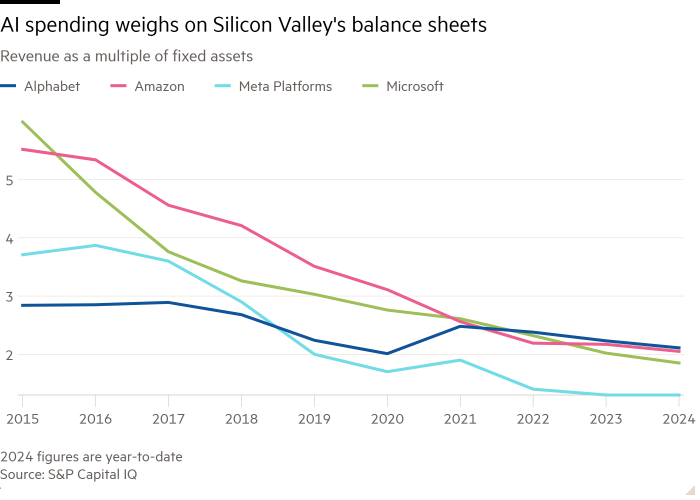Unlock the Editor’s Digest for free
Roula Khalaf, Editor of the FT, selects her favourite stories in this weekly newsletter.
In a moment of commendable self-knowledge, Mark Zuckerberg admitted this week that Meta Platforms’ colossal artificial intelligence investment is “not what investors want to hear”. He might be speaking for any of the big technology companies lately reporting earnings. What investors might like to hear is more detail about how these initiatives will shake out.
Amazon added to the mountain of investment and uncertainty on Thursday. The ecommerce group said it would spend $75bn this year, a jump of more than 50 per cent, largely on data centres and servers for its Amazon Web Services division. Chief executive Andy Jassy, like Zuckerberg and their counterparts at Alphabet and Microsoft, lightened the blow with revenue and earnings growth that easily beat analysts’ expectations.
Silicon Valley executives are doing what they can to show discipline, rolling up their sleeves and cutting costs. That shows up in wider operating margins, and sometimes in sharper elbows. Facebook owner Meta fired a handful of staff for misusing their meal allowances. Amazon wants workers back to the office to bolster productivity, to the chagrin of some.
Yet too much about future returns remains fuzzy. When asked how big next year’s investment will be, executives demur. Jassy said Amazon would spend “more”, Alphabet’s finance chief flagged “an increase” and Meta warned of a “significant acceleration”. While some companies are already making money from AI, none will be drawn on how much more will come, or when.
If investors cannot predict with confidence, they can at least measure. They could even dust off an unfashionable old accounting ratio: fixed asset turnover. This expresses revenue as a multiple of holdings of property, computers, data centres and other chunky objects. Norms vary by industry. A bricks-laden retailer, for example, might aim for a ratio of 2.5 times. The efficient Walmart manages five.

With the arrival of cloud computing and AI, the ratio has fallen for tech titans. A decade ago, Amazon and Microsoft could boast fixed asset turnover of nearly six times in round numbers, according to S&P Capital IQ; today, both manage about two. Meta has fallen from four to one, Alphabet from three to two. All have expanded their sales sharply, but the amount of solid stuff on their balance sheets has risen even faster.
It is worth watching how long it takes these numbers to get back to something like the good old days — although the era of being truly asset light is probably gone forever. Jassy suggested on Thursday that the AI race is a once-in-a-lifetime opportunity, and if all goes well, “shareholders will feel good” about it. Good feelings keep share prices aloft. A more tangible marker of success would not hurt either.